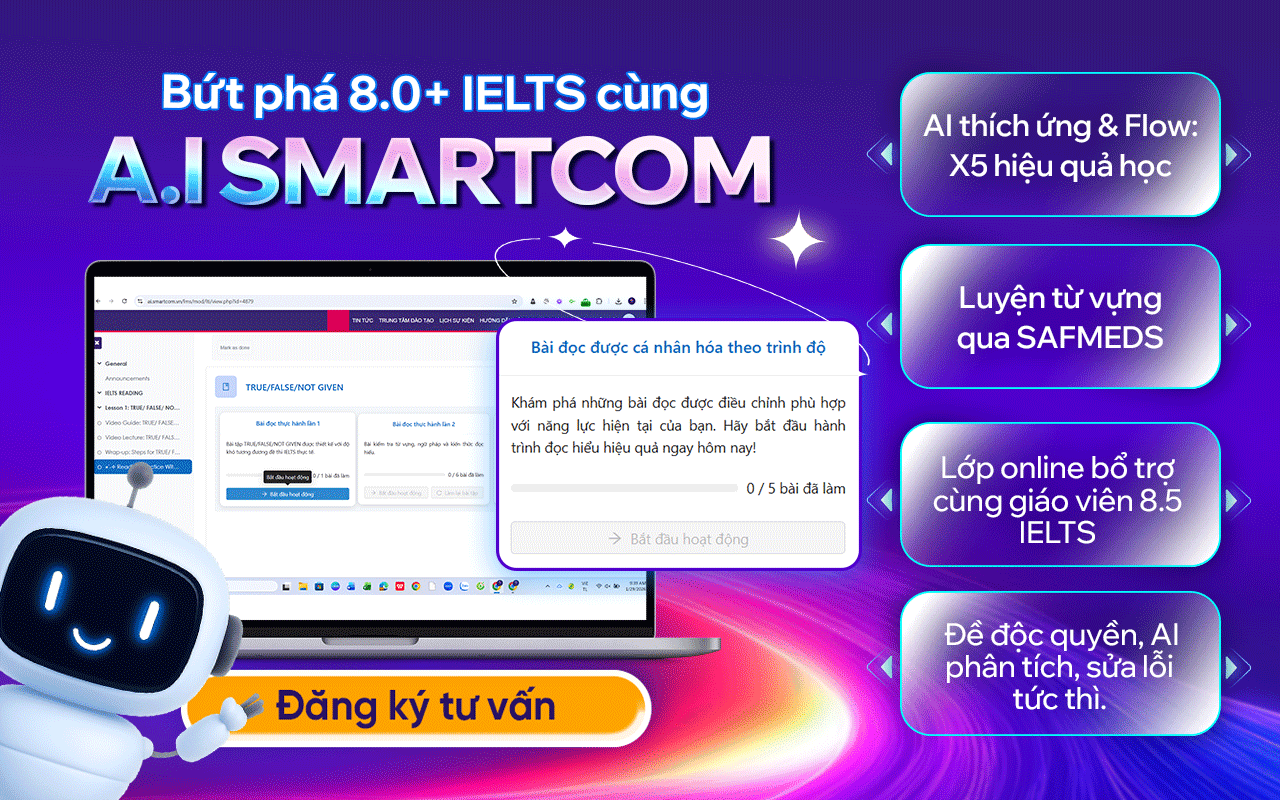Đội ngũ chuyên gia tại Smartcom English là tập hợp những chuyên gia đầu ngành trong lĩnh vực IELTS nói riêng và tiếng Anh nói chung. Với phương pháp giảng dạy sáng tạo, kết hợp với công nghệ AI, chúng tôi mang đến những trải nghiệm học tập độc đáo và hiệu quả. Mục tiêu lớn nhất của Smartcom Team là xây dựng một thế hệ trẻ tự tin, làm chủ ngôn ngữ và sẵn sàng vươn ra thế giới.
Audio trong bài

Chào các bạn. Smartcom IELTS GEN 9.0 thuộc hệ thống Smartcom English xin giới thiệu với các bạn những từ vựng và cụm từ hữu ích cho chủ đề Work/Job (Công việc), được cho điểm rất cao trong các bài thi IELTS thực tế với cả kỹ năng Viết và Nói.
Học từ vựng cho chủ đề Work/Job là việc nhất thiết phải làm, vì từ vựng này sẽ được sử dụng liên tục trong cuộc sống, trong giao tiếp khi bạn tiếp xúc với người nước ngoài, đi du học, và trong rất nhiều câu hỏi IELTS Speaking và Writing.
Ví dụ như trong bài IELTS Speaking, chủ đề Work/Job có thể được hỏi với những câu hỏi Part 1 như sau:
- What do you do?
- What are your responsibilities?
- Why did you choose to do that type of work (or, that job)?
- Is there some other kind of work you would rather do?
- Do you enjoy your work?
- What do you like about your job?
- What do you dislike about your job?
- (Possibly) Do you miss being a student?
Hay những câu hỏi IELTS Speaking Part 2 như:
Describe an interesting job that you would like to do in the future
You should say:
- what the job is
- how you learned about this job
- what skills this job requires
and explain why you would like to do this job
Hoặc bạn có thể gặp câu hỏi sâu hơn về vấn đề này như:
Describe a person you know who does a job which is useful to society
- Who this person is
- How you knew him/her
- What type of work he/she does
And explain why you think his/her work is useful to society.
Và câu hỏi ở Part 3:
- Which jobs would you say are most respected in your country?
- Some people say it’s better to work for yourself than be employed by a company. What’s your opinion?
- What are some of the important things a candidate should find out before accepting a job?
- Is money always the most important thing when choosing a job?
Dưới đây là 30 từ và cụm từ hữu ích giúp bạn có thể có một bài IELTS Speaking rất hay về chủ đề Hobbies rất dễ học. Chùm từ vựng này không khó, nhưng rất đặc thù và khi bạn vận dụng tốt vào bài nói IELTS thì điểm số của bạn sẽ khá ấn tượng đấy.
- career /kə’riə/ (n): nghề nghiệp
- part-time /´pa:t¸taim/ (adj): bán thời gian
- full-time /ˌfʊl ˈtaɪm/ (adj): toàn thời gian
- permanent /’pə:mənənt/ (adj): dài hạn
- temporary /ˈtɛmpəˌrɛri/ (adj): tạm thời
- holiday entitlement /ˈhɒl.ɪ.deɪ ɪnˈtaɪ.təl.mənt/ (n): chế độ ngày nghỉ được hưởng
- sick pay /sɪk peɪ/ (n): tiền lương ngày ốm
- holiday pay /ˈhɒl.ɪ.deɪ peɪ/ (n): tiền lương ngày nghỉ
- overtime /ˈəʊ.və.taɪm/ (n): ngoài giờ làm việc
- to apply for a job /əˈplaɪ ʤɒb/ (v): xin việc
- to accept an offer /əkˈsept ˈɒf.ər/ (v): nhận lời mời làm việc
- starting date /ˈstɑː.tɪŋ deɪt/ (n): ngày bắt đầu
- leaving date /ˈliː.vɪŋ deɪt/ (n): ngày nghỉ việc
- working hours /ˈwɜː.kɪŋ ˈaʊərz/ (n): giờ làm việc
- maternity leave /məˈtɜː.nə.ti liːv/ (n): nghỉ thai sản
- promotion /prə’mou∫n/ (n): thăng chức
- salary increase /ˈsæl.ər.i ˈɪn.kriːs/ (n): tăng lương
- training scheme /ˈtreɪ.nɪŋ skiːm/ (n): chế độ tập huấn
- part-time education /ˌpɑːt ˈtaɪm ˌɛdʒ.ʊˈkeɪ.ʃən/ (n): đào tạo bán thời gian
- travel expenses /ˈtræv.əl ɪkˈspen.sɪz/ (n): chi phí đi lại
- health and safety /helθ ænd ˈseɪf.ti/ (phrase): sức khỏe và sự an toàn
- boss /bɔs/ (n): sếp
- colleague /ˈkɒli:g/ (n): đồng nghiệp
- trainee /trei’ni:/ (n): nhân viên tập sự
- job description /ʤɒb dɪˈskrɪp.ʃən/ (n): mô tả công việc
- department /di’pɑ:tmənt/ (n): phòng ban
- salary advance /ˈsæl.ər.i ədˈvɑːns/ (n): lương tạm ứng
- subsidize money /ˈsʌb.sɪdaɪzd ˈmʌn.i/ (n): tiền trợ cấp
- to get the sack /ɡet sæk/ (v): bị sa thải
- salary /ˈsæləri/ (n): lương tháng
Và đây là bài nói mẫu sử dụng 30 từ vựng và cụm từ trên. Bạn hãy đọc kỹ bài mẫu này, vì cách diễn đạt hoàn toàn bản địa của nó. Bài mẫu được các cựu chuyên gia khảo thí IELTS tại Smartcom IELTS GEN 9.0 biên soạn, nên nó có tính ứng dụng rất cao trong bài thi IELTS, được đánh giá cao nhờ tính tự nhiên của bản ngữ, mà lại không quá khó sử dụng.
Question 1: Describe an interesting job that you would like to do in the future.
Sample answer:
I would like to talk about a fascinating job that I aspire to pursue in the future, which is that of a wildlife conservationist. This job entails working to protect and preserve the natural habitats of various species, contributing to biodiversity conservation.
As a wildlife conservationist, I envision working full-time to address environmental challenges and promote sustainable practices. The role would involve conducting research on endangered species, implementing conservation projects, and collaborating with local communities to raise awareness about the importance of preserving our ecosystems.
One of the appealing aspects of this career is the potential for both part-time and temporary opportunities. Conservation projects often require additional support during specific seasons or for special initiatives, providing flexibility in work arrangements. This could allow me to engage in part-time work or short-term projects while maintaining a commitment to the cause.
While it’s common for such roles to be temporary or project-based, the prospect of sick pay and holiday pay is crucial for job satisfaction and overall well-being. Given the demanding nature of fieldwork and the potential exposure to challenging environments, having sick pay would offer a sense of security. Additionally, the availability of holiday pay ensures that professionals can take breaks, recharge, and return to their duties with renewed energy.
In terms of salary, the compensation in the field of wildlife conservation can vary. However, the intrinsic rewards of contributing to environmental sustainability and the well-being of the planet outweigh the monetary aspects for many individuals in this line of work.
In conclusion, the role of a wildlife conservationist presents a fulfilling and interesting job opportunity for the future. The blend of full-time commitment, potential for part-time or temporary engagements, along with provisions for sick pay and holiday pay, aligns well with my career aspirations and values.
Question 2: In what way is your family important to you?
Sample answer:
While financial considerations are crucial in choosing a job, solely focusing on money can sometimes lead to dissatisfaction and, in extreme cases, getting the sack. It’s important to view a job not just as a means to subsidize money but as a source of personal fulfilment and professional growth. A supportive boss can play a pivotal role in job satisfaction; working under a motivating leader often contributes positively to the overall work experience. Considering factors beyond monetary compensation, such as a positive work environment and opportunities for skill development, can lead to a more holistic and fulfilling career choice. Ultimately, balancing the need for financial stability with the desire for a positive work atmosphere is key to making a well-rounded decision when it comes to choosing a job.
Hãy để lại tin nhắn hoặc bình luận của bạn nếu bạn thấy bài viết này hữu ích, hoặc cần đặt thêm câu hỏi về IELTS và từ vựng theo các chủ đề khác cho Smartcom IELTS GEN.
Kết nối với mình qua
Bài viết khác



![[PDF + Audio] Tải Sách IELTS Cambridge 19 (Kèm đáp án)](https://smartcom.vn/blog/wp-content/uploads/2024/06/ielts-cambridge-19_optimized.png)


![[PDF + Audio] Tải Sách IELTS Cambridge 17 (Kèm đáp án)](https://smartcom.vn/blog/wp-content/uploads/2024/07/sach-ielts-cambridge-17_optimized.jpg)

![[PDF + Audio] Tải Sách IELTS Cambridge 15 (Kèm đáp án)](https://smartcom.vn/blog/wp-content/uploads/2024/07/ielts-cambridge-15_optimized.jpg)








